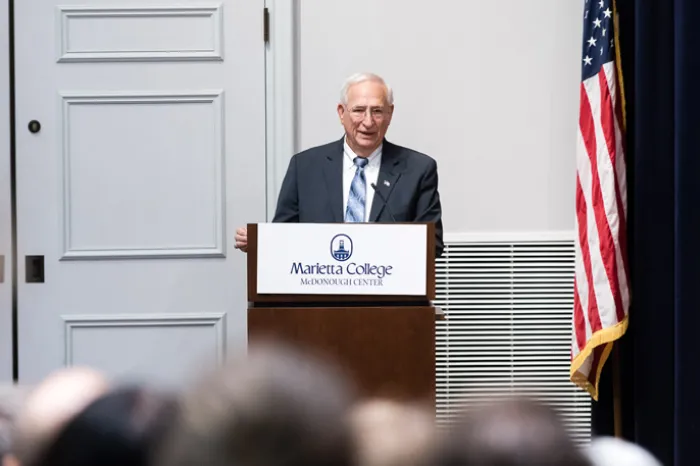
Thirty-seven members of Marietta College’s Physician Assistant Studies Class of 2019 participated in the annual White Coat ceremony held on Saturday, October 21st.
The ceremony marked a day of transition for the Physician Assistant (PA) students as they progressed from being students to being officially welcomed into the PA profession, marking an important step on their journey toward becoming certified physician assistants.
In the five months since they started the program, the Class of 2019 has made remarkable accomplishments. Already, they have learned about health policy, healthcare economics, public health, laboratory studies and research. They have covered introductory material related to physiology, pharmacology and pathophysiology; dissected an entire human body; and have taken 20 exams.
Some have made presentations on health-related topics to preschool children at the Ely Chapman Education Foundation in Marietta, and others have already had clinical experiences with patients at the Washington County Free Clinic. Able now to diagnose individuals with a myriad of psychiatric and neurological conditions, they can all already expertly take vital signs, perform HEENT (head, eyes, ears, nose and throat) examinations, neurologic and MSK (musculoskeletal) exams.
The ceremony served as a celebration of so much already accomplished as well as an acknowledgment of the great insights and progress to come.
At the ceremony, Miranda Collins, Director of the Marietta College PA Program, provided a brief history of the significance of the physicians’ white coats.
She recounted that, lab coats were tan/beige, but they turned white when hospitals began to adopt the color as a symbol of healing, cleanliness and hope. Physicians themselves started wearing white coats only around the turn of the 20th century. For them, the color white symbolized professionalism, purity of intent and seriousness of purpose. While this attire has been around for more than 100 years, the white coat ceremony only began in the early 1990s at Columbia University College of Physicians and Surgeons.
Since then, many schools have adopted this tradition, including Marietta. October 21st marked the 16th white coat ceremony at Marietta College.
Before the awarding of the white coats, the ceremony’s guest of honor, Kenneth Ferrell, spoke to the crowd.
After attending the U.S. Navy Hospital Corps School and being stationed for two years, Ferrell was handpicked by Dr. Eugene Stead, now considered the founder of the PA profession, to join a cohort of four students to matriculate into the first PA program in the country at Duke University.
Ferrell remained at Duke after completing the program, working clinically for 20 years with pulmonary and allergy specialist Dr. Herbert O. Sieker. Upon leaving clinical practice in 1987, he became an administrative manager with Duke’s Private Diagnostic Clinic where, over the next 20 years, he became an expert in reimbursement, coding and compliance regulations.
In addition to being a pioneer in the world of physician assistants, Ferrell is a charter member of the American Academy of Physician Assistants and was inducted into the Duke PA Program’s Alumni Hall of Fame in 2009. He officially retired from his prestigious and distinguished medical career in 2007.
Emma Ottman, President of the MCPAP Class of 2018, also spoke at the ceremony, sharing some words of wisdom.
The awarding of white coats and program pins followed Ferrell’s talk. Once the final student received their coat and pin, the cohort gathered to recite the PA oath. Upon receipt of their white coats, Collins gave the cohort the charge of living up to the uniform’s symbolism.
“With receiving your white coat, you also received its historical symbols of healing, hope and professionalism,” she said. “This obligates you in turn to acquire all the expectations, responsibilities, and commitments that live in its pockets.”
Collins continued by noting that while the students still have much to learn, very soon, patients will look to them for quality and compassionate care.
“Soon you will be working with real patients — patients who when they see you in your white coat, will see a health care provider who can provide relief from their pain, help for their loved one, care for their children, and a cure for their condition,” she said. “They will trust you with personal information and expect you to be competent, professional and compassionate PAs.”
Above all else, Collins encouraged the students not to lose sight of the human element when they practice their work.
“It’s a given that you must remain current with the science and technological aspects of medicine but please don’t neglect the importance of compassion, empathy, patience and the power of the human touch,” she said. “These are so critical but often lacking elements in patient care.”
A celebratory reception attended by alumni, faculty and staff, family and friends and Board of Trustees members followed the ceremony.